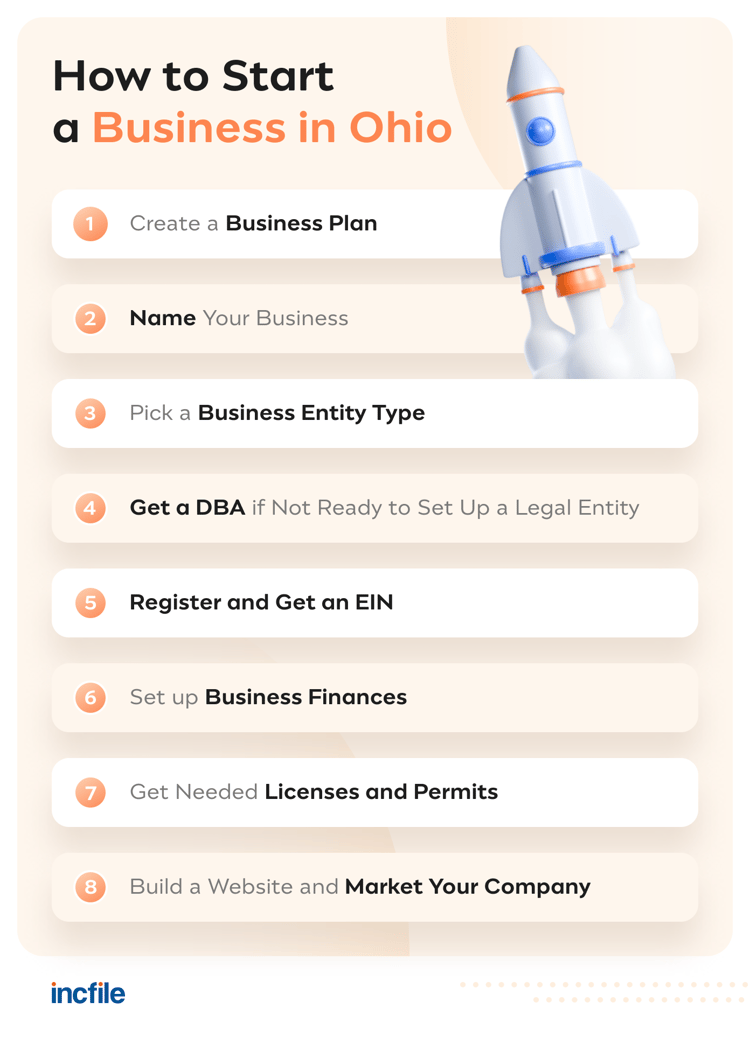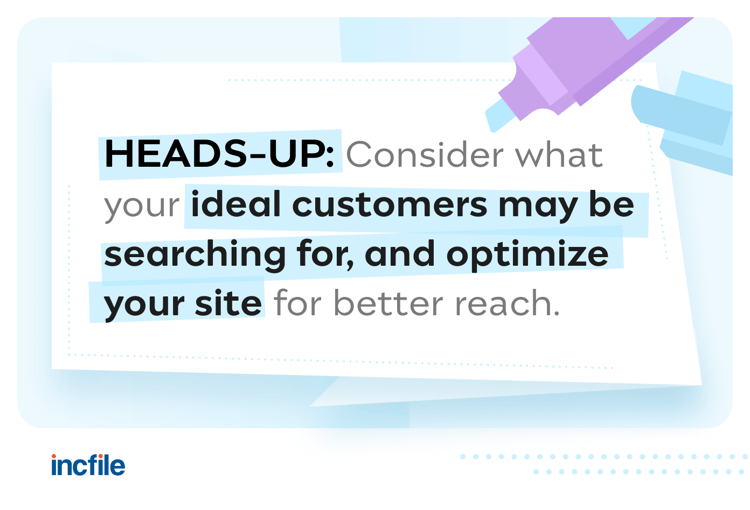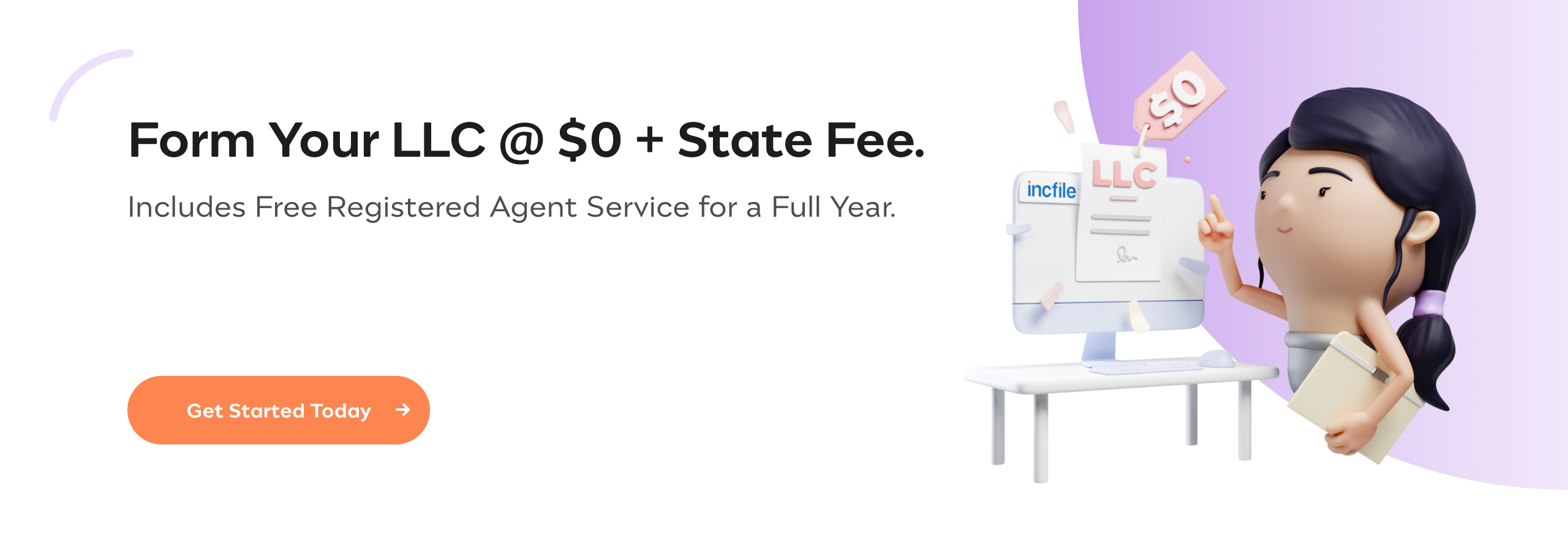Ohio's diverse and thriving small business industry plays a vital role in the state's economy. Small businesses account for more than 99% of all businesses in Ohio. Known for manufacturing, tech, and biosciences, Ohio is popular with small business owners who enjoy the state's generous funding programs and excellent business development services.
To start a business in Ohio, follow these eight steps.

1. Create a Business Plan
Creating a business plan is a crucial step in starting a business in Ohio. A well-crafted business plan can help you secure funding and provide a roadmap for the future of your business. Here's how to create your business plan:
- Outline your business idea, including what products or services you plan to offer and your target market. Be sure to conduct market research to determine the demand for your product or service and identify your competitors.
- Include an executive summary at the beginning of your business plan, providing an overview of your business idea, target market, marketing strategy, financial projections, and other key information.
- Determine your business structure. Decide whether your business will be a sole proprietorship, LLC, corporation, or other business structure. This decision will affect your tax liabilities, legal responsibilities, and more.
- Write a company description. In addition to outlining your business idea, provide a brief overview of your company, including its history, mission statement, and values for your team to follow.
- Develop a marketing strategy. Determine how you will reach and engage with your target audience. Include details about your brand, advertising, promotion strategies, social media presence, and other marketing tactics.
- Create a management plan. Outline your organizational structure, management team, and personnel needs. Include job descriptions, resumes, and any other relevant information about your team.
- Conduct a SWOT analysis. Identify your business's strengths, weaknesses, opportunities, and threats. This analysis can help you develop strategies to address challenges and capitalize on opportunities.
- Include financial projections. Estimate your startup costs, monthly expenses, and projected revenue for the first few years of your business. Include a cash flow statement, balance sheet, and income statement to give investors and lenders a clear understanding of your financial situation.
Remember — your business plan should be a living document that evolves as your business grows and changes. Regularly reviewing and updating your plan will help to ensure that it remains relevant and accurate throughout the course of your business.

2. Name Your Business
Choosing the right name when starting a business in Ohio is an important decision, and there are a few key ideas to consider:
- Be sure that the name you choose is unique and not already in use by another business in Ohio. You can check the Ohio Secretary of State's website to search for existing business names, or use Incfile's Business Name Search.
- Consider choosing a name that is easy to spell, pronounce, and remember. A simple and memorable name can help your business stand out and make it easier for customers to find you.
- Make sure your business name accurately reflects your brand and the products or services you offer. Your name should be relevant to your business and convey your brand's personality and values.
- Keep in mind that some words may be restricted or prohibited for business names in Ohio. For example, certain words related to banking and insurance may require approval from state regulatory agencies.
Your business name won't be protected from other businesses using it until you form your official business entity. So in the meantime, consider reserving the name you've chosen with the Ohio Secretary of State's office until you're ready to legally form your business. This will ensure your business name is protected and cannot be used by other businesses in the state. You'll need to complete and submit Form 534b to reserve your chosen name. The cost is $39 and the name will be reserved for 180 days.
Your business name is an important part of your brand identity, so take time to choose a name that accurately represents your business and resonates with your target audience.
3. Pick a Business Entity Type
Choosing the right business structure type is an important decision for those who are in the process of starting a small business in Ohio. There are several entity types to choose from, each with its own advantages and disadvantages. Here are the most common business entity types to consider:
- Sole Proprietorship. A sole proprietorship is the simplest and most common business entity type. This entity type is owned and operated by a single individual and has no legal distinction between the owner and the business. The main advantage of a sole proprietorship is its simplicity, but it also comes with the risk of personal liability for business debts and obligations.
- Partnership. A partnership is similar to a sole proprietorship but with multiple owners. This entity type can be a general partnership or a limited partnership, with each partner sharing in the profits and losses of the business. Like a sole proprietorship, a partnership offers simplicity but also features the risk of personal liability for the partners.
- Limited Liability Company (LLC). An Ohio LLC is an immensely popular entity type for those starting a small business in the state. It offers the liability protection of a corporation while still allowing for pass-through taxation like a sole proprietorship or partnership. This means that the LLC's profits and losses are reported on the owner's personal tax returns.
- Corporation (C Corp). An Ohio corporation is a separate legal entity from its owners and provides the highest level of liability protection. However, corporations also have more complex tax and legal requirements, including the need to write and develop corporate bylaws and hold annual meetings.
- S Corporation (S Corp). An S Corporation is a special type of corporation (a subchapter) that allows for pass-through taxation while still providing liability protection. S Corporations are limited to 100 shareholders and have strict eligibility requirements.
- Nonprofit. A nonprofit is a type of organization that is not operated for the benefit of its owners but instead for a specific social, educational, or charitable cause. Nonprofits in Ohio are registered as 501(c)(3) organizations with the IRS and are exempt from paying federal income tax. Nonprofits are typically governed by a board of directors and must meet certain requirements, such as filing annual reports and maintaining financial records.
Starting a business in Ohio means diving into each of these entity types and considering your business's unique needs and goals. While it is possible to change your entity type in the future, most businesses will retain the entity type chosen during incorporation.
4. Get a DBA if Not Ready to Set Up a Legal Entity
If you're not ready to set up a legal entity for your small business in Ohio but still want to operate under a name other than first name and last name, you'll want to file for a DBA (doing business as). A DBA allows you to use a name for your business that's different from your personal name.
To get a DBA in Ohio, you'll need to file a registration form with the Ohio Secretary of State's office. The form will ask for your personal and business information, as well as the name you want to use for your business. You may also need to publish a notice of your DBA in a local newspaper, depending on where you're located in Ohio.
It's important to note that a DBA registration does not provide any liability protection for your business. It simply allows you to use a different name for your business. If you want liability protection, you'll need to set up a legal entity such as an LLC or corporation.
5. Register and Get an EIN
If you plan to hire employees, set up certain legal entities, open a business bank account or loan, or apply for certain types of business licenses in Ohio, you will need to obtain an Employer Identification Number (EIN) from the IRS. What is an EIN? An EIN is a unique nine-digit number that identifies your business for tax purposes.
How do you go about getting an EIN?
- You can apply for an EIN in Ohio online through the IRS website or by mail or fax using Form SS-4. You can also apply by phone by calling the IRS Business and Specialty Tax Line at 1-800-829-4933.
- You'll need to provide information about your business, including the legal name of your business, the type of legal entity you have or plan to form, your business address, and the names and Social Security numbers of any responsible parties.
- Submit your application online or by mail, fax, or phone. If you apply online, you will receive your EIN immediately. If you apply by mail, fax, or phone, you will typically receive your EIN within four weeks.
- Once you receive your EIN, keep a record of it in a safe place. You'll need to have it handy for tax purposes, to open a bank account, and to apply for business licenses and permits.
It's important to note that obtaining an EIN does not automatically register your business with the Ohio Secretary of State or any other state agency. You will still need to register your business and obtain any necessary licenses or permits. Additionally, if you change your business name or legal entity type, you will need to apply for a new EIN.
6. Set Up Business Finances
Setting up business finances is a crucial step in starting a small business in Ohio. By taking these steps, you can help ensure the financial stability and success of your business for the long term.
Here are some steps you can take to set up your business finances:
- Open a business bank account: Separating your personal and business finances is important for tax purposes and financial tracking. Opening a business bank account will also make it easier to manage your finances and keep track of your cash flow.
- Choose accounting software: There are several accounting software options available that can help you manage your business finances. Look for software that offers features such as invoicing, expense tracking, and financial reporting.
- Set up a bookkeeping system: Keeping accurate records of your business finances is essential. Consider hiring a professional bookkeeper or using accounting software to help you keep track of income, expenses, and other financial transactions.
- Determine your tax obligations: Understanding your tax obligations is critical to managing your business finances. You can consult with a tax professional or the Ohio Department of Taxation to determine what taxes you need to pay and how to properly file your tax returns.
- Create a budget: Creating a budget can help you plan for expenses and manage your cash flow. Consider your fixed expenses, such as rent and utilities, as well as variable expenses, including inventory and marketing.
7. Get Needed Licenses and Permits
Do you need a business license to start a business in Ohio? You may be required to obtain certain permits or licenses to certify that either the state or your municipality has approved you to pursue business activities. Here are some steps you can take to obtain the necessary licenses and permits in Ohio:
- Determine your licensing requirements: Depending on your business type, industry, and location, you may need to obtain licenses and permits from the federal, state, and local levels. Research which licenses and permits are required, such as a business license, and obtain them from the Ohio Secretary of State.
- Apply for state permits: Depending on your business type, you may need to apply for state permits, such as a sales tax permit or an air pollution permit. Check with the Ohio Department of Commerce to determine which permits are needed.
- Apply for federal permits: If your business is involved in industries such as agriculture, alcohol, or firearms, you may need to apply for federal permits.
- Obtain local permits: Some cities and counties in Ohio require additional permits for businesses, such as zoning permits or health permits.
- Maintain compliance: Once you obtain your licenses and permits, it is important to maintain compliance with all regulations and renew your licenses and permits as needed.
By obtaining the necessary licenses and permits for your small business in Ohio, you can help ensure that your business operates legally and avoid any potential legal issues.
8. Build a Website and Market Your Company
When customers are searching for the products or services you provide, your business should appear in web searches and places like Google Maps. This is the best way to reach your customers, and a website offers you the chance to review your visitor traffic and understand your customers' purchase decisions. Developing a strong digital marketing strategy will also enable you to reach your ideal customers in the places where they "hang out" online.
Here are a few things you can do to market your Ohio business successfully:
- Create a website: A website will let potential customers learn more about your business and what it offers. You can either build the website yourself, hire a professional web designer, or use a website builder like Squarespace or Wix.
- Optimize your website for search engines: Search engine optimization (SEO) can help your website rank higher in search engine results, making it easier for potential customers to find you. You can optimize your website by including relevant keywords, creating high-quality content, and obtaining backlinks from other websites.

- Utilize the power of social media: Social media platforms such as Facebook, Instagram, and Twitter can be powerful marketing tools for your business. By creating a social media presence and regularly posting updates, you can engage with your customers and attract new ones.
- Connect through email marketing: Email marketing is a great way to stay in touch with your customers and promote your business. You can use email to send newsletters, promotions, and other updates to your subscribers.

- Attend networking events: Attending local networking events can help you connect with other business owners and potential customers. You can also join local business organizations to meet other entrepreneurs and gain exposure for your business.
Benefits of Starting a Business in Ohio
Is Ohio a good place to start your new business? Absolutely. Business owners love Ohio's centralized location, affordable tax rates, business funding, and more. Here are all the benefits of starting a business in Ohio:
- Strategic Location: Ohio is strategically located between the East Coast and the Midwest, making it an ideal location for businesses wanting to reach a larger market.
- Business-Friendly Environment: Ohio has a business-friendly environment with low taxes, affordable real estate, and a skilled workforce that can help your business succeed.
- Support for Entrepreneurs: Ohio has a number of resources to support entrepreneurs, including accelerators, incubators, and other support organizations.
- Access to Funding: There are a variety of funding options available for entrepreneurs, including venture capital, angel investors, and grants for starting a business in Ohio.
Grants for Starting a Business in Ohio
In particular, there are several grants for starting a business in Ohio that can help small business owners get started. These include the Small Business Innovation Research (SBIR) and Small Business Technology Transfer (STTR) programs, which provide funding for research and development projects. The Ohio Third Frontier program provides funding for technology-based startups, while the Ohio Development Services Agency offers grants for businesses in certain industries, such as manufacturing and energy.
Ohio State Rules and Regulations
Starting and running a small business in Ohio requires compliance with various rules and regulations. Businesses must register with the Ohio Secretary of State's office, obtain necessary permits and licenses, and register for taxes. Ohio imposes several taxes on businesses, such as sales tax, use tax, and employer withholding tax. Small businesses must comply with all applicable tax laws.
Employment laws in Ohio also apply to small businesses, including minimum wage laws, overtime laws, and anti-discrimination laws. Environmental regulations are also in place, including air and water quality, waste management, and the handling of hazardous material. Depending on the nature of the business, small businesses may also need to obtain certain licenses and permits from the state or local government.
FAQs About Starting a Business in Ohio
How Much Does It Cost to Start an LLC or Business in Ohio?
Registering an LLC or corporation in Ohio costs a $99 state fee. With Incfile, you can pay your state fee and we'll do all the paperwork for free — plus, you get a free Registered Agent for the first year of running your business in Ohio.
What Are the Requirements to Start a Business in Ohio?
To start a business in Ohio, you must choose a business name, decide on the business entity type, register with the Ohio Secretary of State's office, obtain any necessary licenses and permits, obtain an EIN, and comply with all applicable rules and regulations.
How Much Can a Small Business Make Before Paying Taxes in Ohio?
According to the Ohio Department of Taxation, "The first $250,000 of business income earned by taxpayers filing 'Single' or 'Married filing jointly,' and included in federal adjusted gross income, is 100% deductible." Business income in excess of this amount is taxed at a flat rate of 3%. However, businesses with employees are required to pay unemployment insurance taxes and withholding taxes as well as sales taxes if the business sells goods or physical products.
Need Help Starting a Small Business in Ohio?
Incfile provides valuable resources for Ohio business owners. Take advantage of our wide range of services, including business formation for $0, Registered Agent services, tax support, and marketing tools. Whether you're just starting out or looking to take your business to the next level, Incfile's experts can provide the support you need to achieve your goals.

